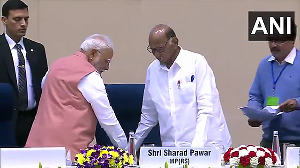.jpg?w=670&h=900) The buck for the Gandamal tragedy should not stop with the school-in-charge Meena Kumari. She is just the face of a deeper malaise in Bihar, says Apoorvanand.
The buck for the Gandamal tragedy should not stop with the school-in-charge Meena Kumari. She is just the face of a deeper malaise in Bihar, says Apoorvanand.
Let us recount some facts to understand the circumstances that led to the death of 23 children at a primary school at Gandamal, Chapra. First, some micro-facts:
- The primary school struck by the tragedy is a Nav Srjit Vidyalaya, a newly created school. In fact, it is a break away from an earlier existing middle school in the village.
- This school, if you care to call it by this name, is a single room structure with a floor full of potholes.
- There was neither a kitchen nor a facility to store the raw food-items.
- There is no source of clean drinking water in the school. There is a hand pump there but you get hard water from it.
- Meena Kumari was not the headmistress of the school . She was only the teacher-in-charge of the school.
The school has two women teachers including Meena Kumari. The other one was on maternity leave at the time of the incident. Meena Kumari was the only teacher left to look after more than 60 children, from class one to five who study there, a duty which includes teaching, supervising the mid-day meal and other administrative duties.
Meena Kumari is a Niyojit Shikshak (absorbed teacher) getting a consolidated salary of Rs 6,300 per month. She was most probably not a trained teacher.
There is no active school management committee for the school as mandated under the RTE .
No education officer or officers responsible for the implementation of the mid-day meal scheme ever visited the school or inspected its facilities.
The village has a very high percentage of SC population, i.e. 27 percent as compared to the state average of nearly 15 percent. The female literacy rate is 19 percent as compared to the total literacy rate of 38 percent. 58 percent of the villagers are agricultural workers as compared to the state average of 48 percent.
Now some macro-facts:
- The government of Bihar has been able to spend only 50-60 percent of the money sanctioned for mid-day meals.
- Figures for the financial year 2011-12 tells us that Bihar was able to use only 43 percent of the stock of grain meant for the MDM.
- The government of Bihar returned approximately Rs 500 crore sanctioned by the Centre for construction of kitchen-sheds and storage facilities in the previous financial year.
- Most of the newly created schools like the ill-fated Gandamal primary school are single room schools and lack facilities like clean drinking water, kitchen sheds, storage facilities or toilets.
- Most of the teachers are untrained and ill-paid. Their posts are not regular.
- The state has resisted the formation of the school management committees. Elections for the same should have been conducted well before the state assembly elections. They were never held.
Some additional facts:
- The Janata Dal-United-Bharatiya Janata Party government granted appointment to approximately 150,000 persons making them school teachers without looking at their qualifications.
- The previous government led by Lalu Yadav had appointed 100,000 para-teachers at a fixed salary of Rs 1,000 per month. The JD-U-BJP government absorbed them enhancing their salary and yet keeping them far below the rank of regular teachers.
- Nearly all of them were appointed by their respective panchayats without following a proper selection process.
- Nearly half of them were untrained and unqualified.
- The persons appointed as cooks get only Rs 1,000 a month. Apart from cooking they have to do additional chores for the schools and for the teacher in charge as well. They are not trained in the matters of hygiene and the job of cooking for large numbers.
The central government, based on the studies by its monitoring institutions, had pointed out that there were gross deficiencies in the implementation of the MDM in Bihar. Lack of hygiene, proper kitchen-shade and storage facilities were specifically mentioned as concerns. The children who fell ill after taking the meal at the schools were rushed to the primary health centre. It had one doctor and two contractual doctors.
The doctor kept administering the wrong medicine and only after instructions from the civil surgeon could give them the right medicine. The ambulance service was grossly insufficient resulting in delay in taking the children to the Chapra main hospital and then the PMCH. Incidentally, the health department was held by a minister belonging to the BJP before Nitish Kumar decided to sack him along with other BJP ministers when he parted ways with the BJP.
What is the reality that these facts construct? It is a reality of a low capability state which cannot even use the money or resources made available to it for its children. It is a state which does not have well defined inspection or verification processes to insure proper implementation of government schemes. It is a state where preparedness for any emergency is zero.
There is absolute lack of co-ordination between different arms of the government. The reflexes of the state are very slow. Non-response to warnings or alerts shows that the state does not have an understanding or sense of urgency in matters where it is most needed. Its surprise over the Centre’s statement that Bihar was alerted regarding these lacunae demonstrates its smugness.
The nature of the social composition of Gandamal explains why the community to which the children belong lack voice. Reports by the NGO Pratichi on the state of primary education in Bihar has been consistent in highlighting the abysmal level of quality in MDM and its other flaws.
It also implies that the state has to be very strong in places where communities with low level of literacy or those consisting largely of agricultural workers lack power to intervene in the affairs of education. In such situations we would need a mechanism to empower these communities. Here, the role of outside civil society agencies or political parties becomes very significant.
However, it is also clear that schooling or processes connected with it are very low on their priority list. That there has been no popular demand for the election of the school management committees is very significant to understand the callousness towards institutional processes prevailing in the society and the connivance of the entrenched political and social interests, which benefit from an informalised status-quo.
The questions we need to ask at the local and state level are:
- Where was the decision to bi-furcate the pre-existing middle school of Gandamal taken and who are the persons responsible for creating a school with zero facilities?
- Why was there no monitoring or overseeing mechanism to ensure proper implementation of the MDM?
- How is a single teacher thought to be capable of ensuring purchase and proper maintenance of food-items, supervise the process of cooking and feeding and yet perform the task of teaching classes one to five at the same time?
- Why are there no SMCs in Bihar?
- What were the measures taken by the state government in response to the concerns raised by different agencies, including Pratichi regarding deficiencies in the MDM in particular and primary education in general?
- Why are teachers paid so low in Bihar?
- Why was the primary health centre so ill-equipped? Why was there no life saving drug in the centre? Why was the main district hospital unable to respond to such emergency? Why are the posts of doctors on contract in Bihar?
- How did the minister know that the food was poisoned deliberately, as part of some nefarious design to defame the state government? Why did he not own responsibility for the absence of the bare minimum facilities at the school at Gandaman?
- Why did the chief minister not think it necessary to go to Gandaman to at least be with the grieving village? One must say that his response to human tragedies has always been very bureaucratic. The devastation caused by Kosi or killings at Forbesganj and similar incidents have failed to move him from his seat.
- Why did the political parties organise a bandh when the need was to battle with the emergency?
Did they provide the villagers resources to help them avail medical facilities? Did they arrange any relief for the victims? If not, what legitimacy do they have to speak on behalf of the victims? Have they ever agitated over the poor state of school education in Bihar, including poor infrastructure, poorly paid and ill-prepared teachers? Has health ever been an issue with them? If the state and the political class failed to make any human response to this tragedy, what does it say about them?
The media has suddenly discovered that schools are in a bad shape and health services in disarray in Bihar. How is it that for the last eight years they have been portraying a rosy picture of Bihar, refusing to talk about non-performance or lapses in crucial areas like education or health? Social scientists and intellectuals from other fields have been visiting Bihar regularly at the invitation of the state government.
Their uncritical relationship with the state has led them to maintain a strategic public silence about the basic issues like collapse of primary, secondary and higher education in Bihar. Are not the media and the intelligentsia, especially from outside, who embedded themselves in the state and kept legitimising it behaving as its propagandists also responsible for the arrogant neglect with which the state government felt safe to treat its people?
Meena Kumari is absconding. She will be caught sooner or later. To think, however that hanging her would bring justice to the wronged children and their families would be a folly. We would need to find answers to the questions asked here and fix responsibilities at the right quarters. Or, we should be prepared for more such tragedies, which will keep recurring in various forms.
Image: The affected children in hospital











 © 2025
© 2025